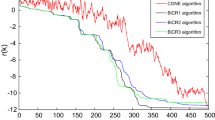Abstract
Linear systems with complex coefficients arise from various physical problems. Examples are the Helmholtz equation and Maxwell equations approximated by finite difference or finite element methods, that lead to large sparse linear systems. When the continuous problem is reduced to integral equations, after discretization, one obtains a dense linear system. The resulting matrices are generally non-Hermitian but, most of the time, symmetric and consequently the classical conjugate gradient method cannot be directly applied. Usually, these linear systems have to be solved with a large number of unknowns because, for instance, in electromagnetic scattering problems the mesh size must be related to the wave length of the incoming wave. The higher the frequency of the incoming wave, the smaller the mesh size must be. When one wants to solve 3D-problems, it is no longer practical to use direct method solvers, because of the huge memory they need. So iterative methods are attractive for this kind of problems, even though their convergence cannot be always guaranteed with theoretical results. In this paper we derive several methods from a unified framework and we numerically compare these algorithms on some test problems.
Similar content being viewed by others
References
S.F. Ashby, T.A. Manteufel and P.E. Saylor, A taxonomy for conjugate gradient methods, SIAM J. Numer. Anal. 27 (1990).
G.A. Behie and P.A. Forsyth Jr., Incomplete factorization methods for fully implicit simulation of enhanced oil recovery, SIAM J. Sci. Stat. Comput. 5 (1984).
T.F. Chan, L. de Pillis and H. van der Vorst, A transpose-free squared Lanczos algorithm and application to solving nonsymmetric linear systems, UCLA Research report (1991).
S.C. Eisenstat, H.C. Elman and M.H. Schultz, Variational iteration methods for non-symmetric systems of linear equations, SIAM J. Numer. Anal. 20 (1983).
R. Fletcher, Conjugate gradient methods for indefinite systems,Proc. Dundee Conf. on Numerical Analysis (Springer, 1976).
R. Freund, On Conjugate Gradient type methods and polynomial preconditioners for a class of complex non-Hermitian matrices, Numer. Math. 57 (1990).
G. Golub and G. Meurant,Résolution Numérique des Grands Systèmes Linéaires (Eyrolles, Paris, 1981).
M.H. Gutknecht, Changing the norm in conjugate gradient type algorithms, ETH IPS Research report.
M.H. Gutknecht, Variants of BICGSTAB for matrices with complex spectrum, ETH IPS Research report 91-14.
D.A.H. Jacobs, A generalization of the Conjugate-Gradient method to solve complex systems, IMA J. Numer. Anal. 6 (1986).
P. Joly, Méthodes de gradient conjugué, Publications du Laboratoire d'Analyse Numérique Université Pierre et Marie Curie, Paris (1984).
D.G. Luenberger,Introduction to Linear and Nonlinear Programming (Addison-Wesley, 1973).
N.M. Nachtigal, S.C. Reddy and L.N. Trefethen, How fast are nonsymmetric matrix iterations, Numerical Analysis Report 90-2, Massachusetts Institute of Technology (1990).
Y. Saad and M.H. Schultz, Gmres, a generalized minimal residual algorithm for solving nonsymmetric linear systems, SIAM J. Sci. Stat. Comput. 7 (1986).
P. Sonneveld, CGS, a fast Lanczos-type solver for nonsymmetric linear systems, SIAM J. Sci. Stat. Comput. 10 (1989).
P.K.W. Vinsome, Orthomin: an iterative method for solving sparse sets of simultaneous linear equations,Proc. 4th Symp. on Reservoir Simulation (1976).
Author information
Authors and Affiliations
Additional information
Communicated by C. Brezinski
Rights and permissions
About this article
Cite this article
Joly, P., Meurant, G. Complex conjugate gradient methods. Numer Algor 4, 379–406 (1993). https://doi.org/10.1007/BF02145754
Received:
Issue Date:
DOI: https://doi.org/10.1007/BF02145754




